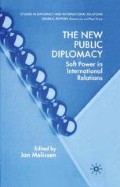Abstract
Public diplomacy, the process by which direct relations are pursued with a country’s people to advance the interests and extend the values of those being represented, appears to be an idea whose time has come. The consensus is that it is made necessary by economic interdependence, possible by the communications revolution, and desirable by the rise in democratic and popular expectations. Even the emerging civilizational wars, which some argue are disrupting this picture, do not tell against public diplomacy, in fact quite the reverse. In the aftermath of the events of 11 September 2001, governments, it is now customary to argue, will have to conduct more public diplomacy and become better at it.1 However, this consensus about the importance of public diplomacy is not matched by a similar consensus regarding the consequences of its use for what remains an international society of states. Are governments merely to work harder at getting their message out to target markets in the same way that private enterprises seek to boost their sales? Or, in so doing, are they participating in the further disaggregation of existing social structures and the replacement of the constricted and constraining communications of states by real conversations between peoples?
Access this chapter
Tax calculation will be finalised at checkout
Purchases are for personal use only
Preview
Unable to display preview. Download preview PDF.
Notes
See, for example, Margaret D. Tutwiler, ‘US Image Abroad Will Take Years to Repair, Official Testifies’, The New York Times, 5 February 2004; and the US government’s attempts to coordinate public diplomacy, first through the State Department (1999) and more recently through the White House Office of Global Communications, http://www.whitehouse.gov/ogc/aboutogc.html.
See John W. Wheeler-Bennett, Brest-Litovsk: The Forgotten Peace, March 1919 (London: Macmillan, 1966);
Alfred Erich Senn, Diplomacy and Revolution: The Soviet Mission to Switzerland, 1918 (Notre Dame IN: University of Notre Dame Press, 1974);
and Arno J. Mayer, Political Origins of the New Diplomacy, 1917–1918 (New York: Yale University Press, 1959).
Martin Sicker, The Making of a Pariah State: The Adventurist Politics of Muammar Qaddafi (New York: Praeger, 1987), p. 50.
Ronald Bruce St John, Qaddafi’s World Design: Libyan Foreign Policy, 1969–1987 (London: Saqi Books, 1987), p. 45.
B. Scarcia Amoretti, ‘Libyan Loneliness in Facing the World: The Challenge of Islam?’, in Adeed Dawisha (ed.), Islam in Foreign Policy (Cambridge: Cambridge University Press, 1983), p. 54.
All quotes from R. K. Ramazani, Revolutionary Iran: Challenge and Response in the Middle East (Baltimore MD: Johns Hopkins University Press, 1986), pp. 19–20.
David Hoffman, ‘Beyond Public Diplomacy’, Foreign Affairs, vol. 81, no. 2, March/April 2002, p. 85.
Paul Sharp, ‘Mullah Zaeef and Taliban Diplomacy: An English School Approach’, Review of International Studies, vol. 29, no. 4, October 2003.
See, for example, Mark Leonard and Vidhya Alakeson, GoingPublic: Diplomacy for the Information Society (London: Foreign Policy Centre, 2000).
Editor information
Editors and Affiliations
Copyright information
© 2005 Paul Sharp
About this chapter
Cite this chapter
Sharp, P. (2005). Revolutionary States, Outlaw Regimes and the Techniques of Public Diplomacy. In: Melissen, J. (eds) The New Public Diplomacy. Studies in Diplomacy and International Relations. Palgrave Macmillan, London. https://doi.org/10.1057/9780230554931_6
Download citation
DOI: https://doi.org/10.1057/9780230554931_6
Publisher Name: Palgrave Macmillan, London
Print ISBN: 978-0-230-53554-1
Online ISBN: 978-0-230-55493-1
eBook Packages: Palgrave Political & Intern. Studies CollectionPolitical Science and International Studies (R0)

